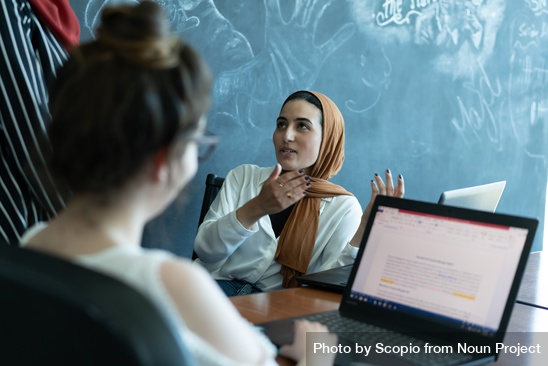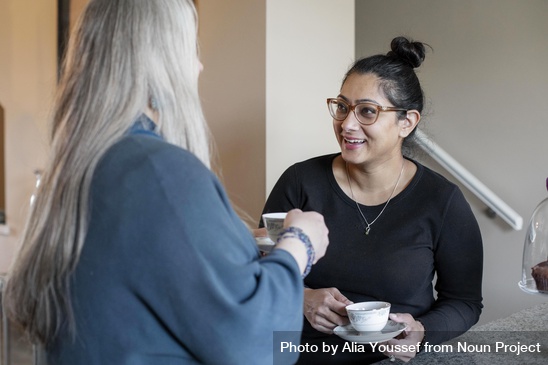
International Women’s Day 2023: ‘Thinking for yourself is (still) a radical act’
International Women’s Day 2023
How many times have you been in a meeting when you’ve been spoken over, or your opinion has been ignored only to be replayed later on (by a man) and taken seriously? Or perhaps you have experienced that feeling of being unheard, even amongst groups of friends and family, even after a long time chatting? When we don’t feel properly heard, it can lead to a sense of loneliness and isolation, and as our opinions and ideas are ignored, we feel not only robbed of our voice but of our value and identity too.

The patriarchy has long ignored the voices of women – I read an article today which noted that only eight women, and no women of colour, are currently employed as Chief Executive Officers in the FSTE 100, while women hold only 14% of executive directorships and 38% of all directorships, according to the Fawcett Society’s Sex and Power report 2022. Clearly there’s still a long way to go (30 years in the finance sector according to a Women in Finance Task Force ) before women achieve gender parity in the workplace; much to do in ensuring women are heard equally, taken seriously.
It takes courage and confidence to show up in a system which celebrates noise – easier said than done when for generation after generation so many women across different cultures, social classes and age groups have been overtly and covertly silenced.
How can we bring change to this unequal system while staying true to our values?
Whatever our gender identity, we can afford women the right to be heard; we can listen attentively, respectfully and without judgement. And when we do this, those quiet or silenced voices will rise to the surface and the women who own them will grow in their confidence to speak up and be heard. Families, friends, communities, businesses, society, humanity will benefit from the diversity of opinion, thought and perspective. We will be operating at our full potential and inviting in such a wealth of insight and understanding which can only bring benefits to all.

So when was the last time you were listened to? Really listened to? For those of us lucky enough to be able to recall this time (notice that the recall may have been easy or difficult – you may be thinking of something which happened recently or having to recall events from the distant past) – what impact did that have for you?
I ask this question often on my coaching courses. Those people who are able to remember a time report that being heard has made them feel valued and validated. Being heard made them recognise that ‘I matter’. In the longer term their confidence grew in proportion to this recognition and they were able to participate with equality in their relationships.
Nancy Kline in her book Time to Think (2002) tells us that listening is generative and that the quality of our attention determines the quality of other people’s thinking. When we show someone we are listening with appreciation, we are enabling them to do their very best thinking and, as Nancy believes (and I wholeheartedly agree), thinking for ourselves is indeed a radical act.
So how can we offer that gift of listening, particularly to those voices we know are often quiet or absent?
10 ways to listen well

- Set an intention to listen, to decide that it is important to do so and fully commit to doing it
- Listen to understand (rather than to respond) or, as Nancy Kline suggests, listen ‘to ignite’
- Be fully present in your conversations (rather than distracted by other thoughts). Mindfulness practice can help with this
- Demonstrate we are listening when it’s in person. This may be through stillness, nodding, eye contact, mirroring body language, tone and volume of our speech (much of this we will do naturally and easily when we set the intention to listen)
- Demonstrate we are listening when it’s in a written form, including social media, by acknowledging that you’ve been paying attention, appreciating the women’s voices you hear, even when you respectfully disagree
- Apply appreciation and curiosity (not judgement) to what we hear
- Ask questions which help people develop their thinking even further (in their interests, not ours)
- Leave space for answers and then even more space (just because someone isn’t talking yet, doesn’t mean they aren’t thinking)
- Notice which voices we usually choose to listen to and give attention to those which for us have so far gone unheard or which we filter out and hear less
- Show gratitude for someone having shared their thinking with you
- If you would like to find out more about a coaching approach, join our short, online ‘Introduction to Coaching’ workshop in May.
- If you’d like to be the first to read more articles like this, subscribe to my newsletter, Consciously Connected
- If you’d like to discover other ways to work with me, you can do so here
